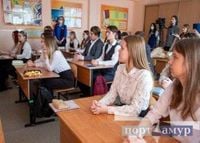The Amur region of Russia is set to implement a significant change in its educational policy, particularly concerning the enrollment of migrant children in local schools. Starting April 1, 2025, children of migrants who do not possess sufficient knowledge of the Russian language will not be allowed to enroll in schools within the region. This move, formalized through a new law, aims to ensure that all students entering the education system have the necessary linguistic skills to participate effectively in their educational programs.
According to the regional Ministry of Education, foreign nationals will only be accepted into educational institutions after presenting documentation that confirms the legality of their stay in Russia. This step is a crucial part of the enrollment process for migrant children, establishing a clear guideline that necessitates fluency in the Russian language.
Before being allowed to attend school, children must undergo a free testing process to evaluate their level of language proficiency. The Ministry emphasized that those who fail to pass the Russian language test, which is deemed essential for mastering educational programs at the primary, basic, and secondary levels, will be barred from enrollment. "Individuals who do not pass the Russian language test insufficient for mastering primary, basic, and secondary educational programs will not be allowed to engage in these educational programs," stated a representative from the Amur region's Ministry of Education.
The testing will consist of both oral and written components, with specific arrangements made for younger children, such as first graders, who will only be required to take an oral assessment. Duration of the entire testing procedure will not exceed 80 minutes, which the Ministry expects will provide a fair evaluation of each child's linguistic capabilities.
If any disputes arise regarding the assessment of the test results, parents will have the right to appeal. The Ministry is preparing to establish an appeal commission to handle these cases, ensuring that concerns about the testing process can be addressed appropriately.
Moreover, to successfully enroll in public educational institutions, children of foreign citizens and stateless individuals must score at least three points on the assessment—an indication that they have achieved a satisfactory level of Russian language comprehension.
The law underscores a growing trend across various regions of Russia, where there is a heightened emphasis on ensuring that all students meet specific linguistic and educational standards. This policy is seen by some as a necessary measure to maintain quality education, while others see it as potentially excluding children from migrant backgrounds who might not yet have had the opportunity to learn the language before their enrollment in school.
Proponents argue that ensuring language proficiency not only assists children in adapting to their new environment but also enhances their educational experience, allowing them to integrate better into the classroom setting and the community at large. They highlight that a strong command of the language is vital for academic success and social engagement.
On the other hand, critics of the law caution against the possible socioeconomic implications it may have, particularly for families from poorer backgrounds who may face barriers in language acquisition. Parents may worry that the stringent requirements could prevent their children from accessing basic education altogether, thereby perpetuating cycles of disadvantage among migrant families.
As the April deadline approaches, the Ministry of Education is finalizing the list of testing organizations and an official schedule for the examinations, which will be published online. This transparency is crucial for ensuring that all stakeholders, particularly parents and their children, are well-informed about the new requirements and can prepare accordingly.
Ultimately, the law seeks to strike a balance between maintaining educational standards and inclusivity, raising questions about how best to support integration while ensuring that children from diverse backgrounds have the opportunity to succeed in the Russian educational system. As the implementation date draws near, the Amur region stands at a crossroads, with the implications of this policy resonating well beyond its borders.


